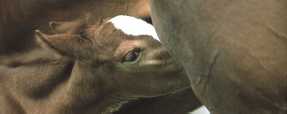The Orphan or Rejected Foal
Colostrum
The foal must receive colostrum within the first 12 – 36 hours of life so the antibodies it contains can kick-start the immune system. If the mare dies during foaling, her colostrum can still be given to the foal but it may be prudent to keep an emergency supply. Failure to provide colostrum during this time can result in, at best, a weak, sickly foal or one requiring plasma infusion, and at worst, death.
Milk
The digestive system of young foals cannot easily cope with solid food, so milk must be provided either from a foster mare or a commercial milk replacer. During the first week of life, a foal can suckle 7-10 times an hour, decreasing to about 3 times an hour after this. Whilst bottle feeding may be the only option initially, if no foster mare is forthcoming, teaching the foal to drink from a bucket is the best alternative.
Free access to milk replacer in a bucket has the advantage that the foal can drink when he chooses and is more likely to consume small quantities at frequent intervals as he would if suckling from the mare. This encourages even growth rates and a healthier gut, with reduced risk of gastric ulcers or other digestive upsets. The foal can also develop a more “normal” relationship with humans as they are not only seen as the direct source of food.
Feeding Advice
- Foal Creep Pellets can be introduced as soon as the foal is consuming all of the milk between feeding times and, from 6 weeks of age, the amount of pellets can be increased and the milk decreased.
- Foals should always have access to forage/grass. Although they will not be able to digest it initially, it is important to encourage this natural behaviour and stimulate the growth of fibre-digesting bacteria.



